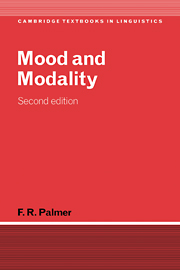Book contents
- Frontmatter
- Contents
- Preface
- Note on the text
- List of abbreviations
- 1 Introduction
- 2 Modal systems: Propositional modality
- 3 Modal systems: Event modality
- 4 Modal systems and modal verbs
- 5 Indicative and subjunctive
- 6 Realis and Irrealis
- 7 Subjunctive and irrealis
- 8 Past tense as modal
- References
- Language index
- General index
3 - Modal systems: Event modality
Published online by Cambridge University Press: 05 June 2012
- Frontmatter
- Contents
- Preface
- Note on the text
- List of abbreviations
- 1 Introduction
- 2 Modal systems: Propositional modality
- 3 Modal systems: Event modality
- 4 Modal systems and modal verbs
- 5 Indicative and subjunctive
- 6 Realis and Irrealis
- 7 Subjunctive and irrealis
- 8 Past tense as modal
- References
- Language index
- General index
Summary
Deontic and dynamic modality refer to events that are not actualized, events that have not taken place but are merely potential, and may, therefore, be described as ‘event modality’. The basic difference between deontic and dynamic modality is that with dynamic modality the conditioning factors are external to the person indicated as the subject (that he is permitted, ordered, etc., to act), whereas with deontic modality they are internal (that he is able, willing, etc., to act). There are, however, some other points. First deontic modality is generally dependent on some kind of authority, often the speaker. Secondly, Commissive (where the speaker guarantees that the action will take place) may also be included under deontic modality. Thirdly, dynamic ability may sometimes be interpreted in terms of the general circumstances that make action possible or impossible (see 1.3.2) rather than the actual ability of the subject.
However, it must be admitted that a great deal of material for this chapter comes from English, for English appears to have a more extensive system of deontic modality than many other languages.
Formal systems
As already noted several times (see especially 1.4.5), the same forms are often used for epistemic and for deontic/dynamic systems. Equally the same form (e.g. can) may be either deontic or dynamic. Moreover, as also noted in 1.4.5, modal markers may occur in the same formal system as other grammatical markers, e.g., the ‘purposive’ marker in Ngiyambaa, which not only may be either epistemic or deontic, but also occurs in a formal system containing tense markers.
- Type
- Chapter
- Information
- Mood and Modality , pp. 70 - 85Publisher: Cambridge University PressPrint publication year: 2001

